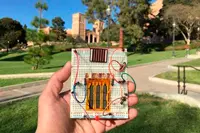 Researchers at UCLA's California NanoSystems Institute say they have combined two nanomaterials to create an energy storage medium that combines the best qualities of batteries and supercapacitors.
Researchers at UCLA's California NanoSystems Institute say they have combined two nanomaterials to create an energy storage medium that combines the best qualities of batteries and supercapacitors.
The hybrid supercapacitor is said to store large amounts of energy, to recharge quickly and to have a lifetime of more than 10,000 recharge cycles. The CNSI scientists say they has also created a microsupercapacitor small enough for use in wearable or implantable devices. Five times thinner than a sheet of paper, the device is claimed to store more than twice as much charge as a typical thin film lithium battery.
Researcher Maher El-Kady noted: "The microsupercapacitor is a new evolving configuration; a very small rechargeable power source with a much higher capacity than previous lithium thin-film microbatteries."
The new components combine laser scribed graphene (LSG) – a very conductive material that charges and recharges very quickly – with manganese dioxide (MnO2). The device can be made without the need for extreme temperatures or expensive 'dry rooms'.
"Let's say you wanted to put a small amount of electrical current into an adhesive bandage for drug release or healing assistance technology," said Professor Richard Kaner, who led the research. "The microsupercapacitor is so thin you could put it inside the bandage to supply the current. You could also recharge it quickly and use it for a very long time."
The researchers found the supercapacitor could quickly store electrical charge generated by a solar cell during the day, hold the charge until evening and then power an LED overnight, showing promise for off-grid street lighting.
"The LSG-MnO2 capacitor can store as much electrical charge as a lead acid battery, yet can be recharged in seconds, whilst storing about six times the capacity of commercially available supercapacitors," Prof Kaner continued. "This … shows a great deal of promise in real world applications, and we're very excited about the possibilities for greatly improving personal electronics technology in the near future."
Author
Graham Pitcher
Source: www.newelectronics.co.uk

